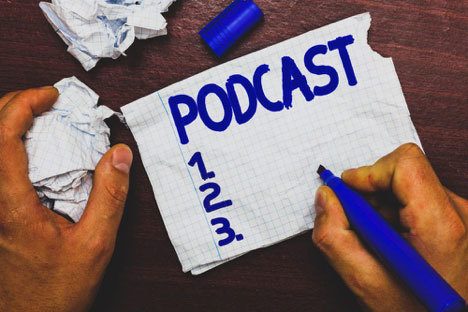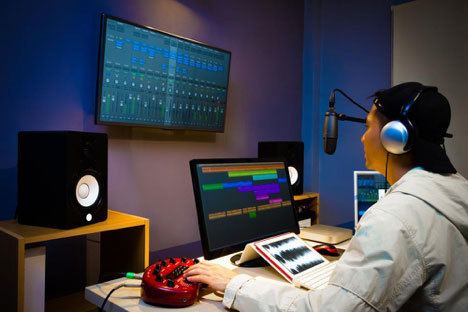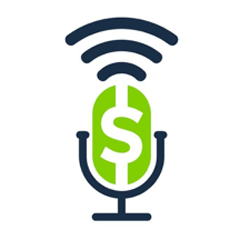Podcasting is a very attractive form of creativity because it’s easy for anyone with an idea to start a show but, unfortunately, there’s also a lot of room for mistakes. Because it seems so simple to start, many people jump into a project without realizing everything that goes into making a podcast.
Sure, having a mic is important, but finding a quality microphone over the cheapest option at Walmart makes all the difference in sound quality–an important element for gaining an audience. Before you dive right into creating your own podcast, learn how to avoid some of the most common mistakes amateur podcasters make.

#1 Purchase Affordable Podcasting Equipment
Equipment is obviously a necessity when it comes to launching a podcast. Without your equipment, you have no way of recording and crafting your material into a successful, entertaining show. And don’t even think of trying to use your cell phone as a recording device. Sound quality is so important when creating a podcast because a show that is difficult to hear will throw listeners out of the experience almost immediately. Find a quality microphone to start and then invest in an all-in-one postcasting bundle to get everything you need. While some new podcasters make the mistake of buying low-quality equipment, others opt for super expensive high-end gadgets that you don’t necessarily need when you’re just starting out. Instead, purchase affordable podcasting equipment with good reviews to create the best quality content.
#2 Write and Pre-Record Episodes Before Launching
Getting the right tone and words into your podcast can be very difficult because shows are designed to sound natural, but when you’re working with a pre-determined script or outline, it’s easy to sound like you’re reading off a paper.
While it’s definitely important to plan out your show—how you’re going to introduce topics, what discussion points you’d like to hit - it’s equally as important to make the conversation flow. You should practice each episode several times before recording the final version to make sure that you’re comfortable with the content and can make it sound organic.
Another common mistake beginner podcasters make often is not recording several episodes before releasing. From the podcasters’ perspective, you’re putting an immense amount of pressure on yourself by writing, recording and editing a new podcast every week.
When you give yourself the time to create each episode perfectly before releasing it into the world, you’ll create a much better product. From the listeners’ point of view, one episode is usually not enough to really get a feel for the show, especially if you’re planning to feature different topics each time. Even if your first episode grabs someone’s attention, it will be difficult for them to remember to tune in for the following release of a new episode as they’ve only been exposed to the podcast once.

#3 Be Careful with Your Editing
Over-editing is probably the most common mistake new podcasters make, particularly if you’ve never used recording equipment before. While the process of recording is relatively easy, the editing becomes a bit more complex. You need to sew each segment of your show into one seamless episode with clear, crisp audio and engaging conversation.
Many podcasters feel inclined to over-edit in the beginning in an attempt to make the podcast sound natural, but this usually results in the opposite effect. You should try to avoid using fillers too often in your speech, but the occasional pause or “umm” is perfectly fine, and it makes the conversation sound real. Editing is much more time-consuming than people believe. Don’t waste time trying to make everything you say sound perfect.
#4 Find a Niche and Stick to a Theme
You need some type of niche or theme driving your show if you want to produce something cohesive that people will want to listen to. If your podcast feels like it’s all over the place and people aren’t quite sure what it’s about or how to describe it to others, you’ll find it tough to attract a large audience. Pick your niche and determine an overarching motif to string through each episode. Of course, topics and discussions will change every episode to avoid becoming monotonous and boring, but there is something to tying each topic together.
#5 Promote Your Show
This is key to producing a great podcast. Without promoting yourself, no one will ever discover your show. With hundreds, maybe even thousands, of podcasts popping up every month, it would be virtually impossible for people to naturally stumble upon your podcast. You need a channel where you can promote your podcast to an audience who would be interested in your content and spread awareness from there. Social media is one of the best places to begin promoting. You can even target users that fit a specific profile that matches your podcast demographic to ensure that your promotions are getting in front of the right people. Once people begin to learn about your podcast, they’ll likely tell their friends and family about it if they enjoyed the show, furthering your promotional efforts and driving more people to your podcast.
#6 Don’t Expect to Make Money Right Away

While many people start a podcast as a personal project, even more people launch one as a way to make extra cash. Creating a great podcast with a large, engaged audience can definitely be a source of income, but it takes a lot of time and effort to get to this point. Don’t get discouraged about the monetary value of your show, but also don’t go into this project thinking you’re going to be making money right away. You should set specific goals prior to launching to keep yourself on track and work your way towards monetizing the show.
With the right preparation, your new show could be a hit with a large audience and promoters paying for ad time. Before you can get to that point, you need to purchase affordable podcasting equipment, perfect your recording and editing abilities and practice, practice, practice. Creating a podcast isn’t as easy as it seems. Avoid making these mistakes and test out a few trial episodes to get you started on the right path.
Podcasting FAQ
What is a podcast?
A podcast is a digital audio or video file that is made available for download or streaming over the internet. Podcasts are usually series of episodes that can be subscribed to and listened to on a computer, mobile device, or other compatible device.
How do I start a podcast?
To start a podcast, you'll need to come up with a concept, choose a name, format, and target audience, and then record and edit your episodes. You'll also need to find a hosting platform to distribute your podcast and submit it to directories like iTunes, Spotify, and Google Play.
What equipment do I need to start a podcast?
At minimum, you'll need a computer, a microphone, and recording software. You may also need headphones, a mixer, and other equipment depending on the complexity of your setup.
How do I promote my podcast?
Promoting your podcast is essential to building an audience. You can promote your podcast on social media, through guest appearances on other podcasts, by running ads, or by leveraging your personal and professional network.
How do I monetize my podcast?
There are several ways to monetize your podcast, including sponsorships, ads, merchandise sales, subscriptions, and affiliate marketing. To monetize your podcast successfully, you'll need to build a large and engaged audience first.
How long should my podcast be?
The length of your podcast will depend on your format, content, and audience preferences. Most podcasts range from 20 to 60 minutes, but some can be much longer or shorter.
How often should I release new episodes?
The frequency of your podcast releases will depend on your content and schedule. Some podcasts release new episodes daily, while others release weekly or monthly. Consistency is key, so choose a schedule that you can commit to.
Can I use copyrighted material in my podcast?
Using copyrighted material without permission can lead to legal issues, so it's best to avoid using copyrighted material in your podcast. If you do use copyrighted material, be sure to get permission or a license from the copyright holder.
How do I measure the success of my podcast?
You can measure the success of your podcast by tracking metrics like downloads, listens, reviews, and engagement on social media. You can also use surveys and feedback to understand how your audience is responding to your content.
How do I keep my podcast interesting and engaging?
To keep your podcast interesting and engaging, you'll need to focus on creating high-quality content, choosing relevant topics, and engaging with your audience. You can also experiment with different formats, guests, and styles to keep your podcast fresh and interesting.

Author Bio: Robin Badman
You might think Robin is a fighter but she's actually a joker. She often riddles for mobile app development companies in NY and OH. She also a ventriloquist and, because she's one of the most wanted fugitives, this photo is fake, obviously.
